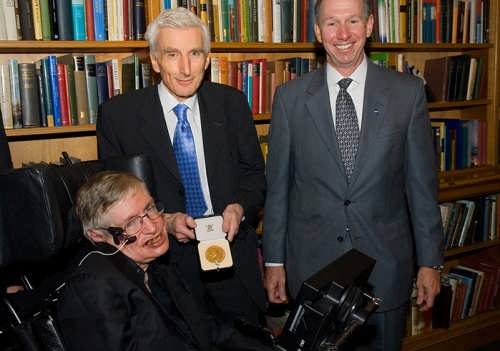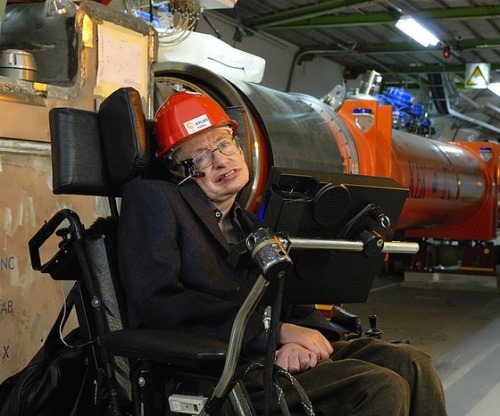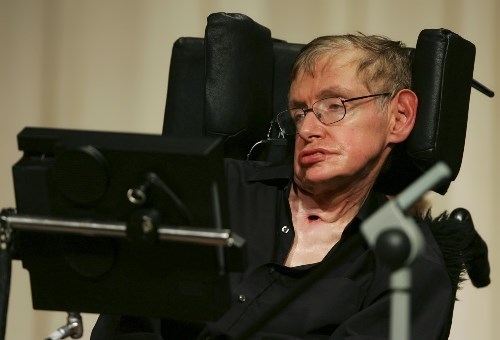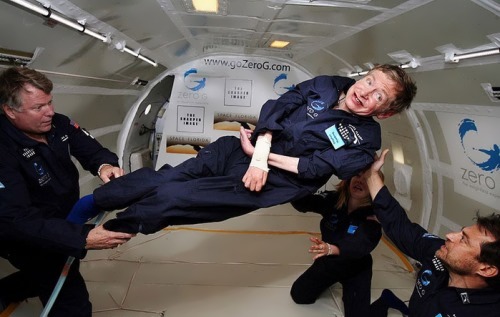Stephen Hawking – English physicist
Stephen Hawking is a well-known physicist, Lucasian Professor of Mathematics at Cambridge University. He is an author of best-selling book A Brief History of Time. He is best known for his contributions to black hole theory and scientific cosmology. He has been called the most insightful theoretical physicist since Albert Einstein.
Stephen William Hawking was born on January 8, 1942, in Oxford. His father was a medical doctor who specialized in tropical diseases. When the boy was 8 years old, the Hawkings moved to the small town of St. Albans. His mother liked to travel while her husband was in Africa, and the family visited many exotic places.
Since early childhood Hawking was interested in cosmology. He always liked controlling things, and he built a great number of models during his childhood.
At the age of 10 Stephen entered secondary school. He developed passions for mathematics and classical music.
Hawking and his friends built a basic computer called LUCE, which they programmed to solve addition problems. In their teens, the group experimented with the metaphysical.
At the age of 17 Hawking applied to University College at Oxford. The second year, he joined the rowing team and became popular.
In the 1960s, Hawking helped establish the theory of black holes and brought them out of the realm of science fiction.
In 1962 Hawking entered Cambridge. He began to have motor problems. In the morning, Hawking had trouble getting his hands to work to tie his shoes. At one point, he fell down a flight of stairs at school and had temporary amnesia.
He was diagnosed with amyotrophic lateral sclerosis (ALS), better known as Lou Gehrig’s disease. This fatal disease weakens all of the body’s muscles and confines him to a wheelchair and requires him to use a computer and voice synthesizer to speak.
In December 1962, he met a young woman named Jane Wilde. The two fell in love. In 1967, their first child, Robert, was born. The next year, Hawking became a staff member of the Institute of Theoretical Astronomy. His second child, Lucy, was born in November of 1970.
In 1979 Hawking’s last child, Timothy, was born. The same year, Hawking was made the Lucasian Professor of Mathematics, Newton’s chair at the University of Cambridge.
Hawking received his Ph.D. in 1965 and obtained a fellowship in theoretical physics at Gonville and Caius College, Cambridge. He worked with Roger Penrose, the eminent mathematician, to investigate the big bang singularity. In 1968, Hawking joined the staff of the Institute of Astronomy in Cambridge. He and Penrose began using complex mathematics to apply the laws of thermodynamics to black holes.
In 1973, he published a book, The Large Scale Structure of Space-Time, written with G. F. R. Ellis. In the same year he visited the Soviet Union, during his stay in Moscow, discussed the problems of black holes with Soviet scientists Yakov Zeldovich and Alexei Starobinski.
In 1988, Hawking’s A Brief History of Time: From the Big Bang to Black Holes was published. The book sold over 8 million copies worldwide, and Hawking became a millionaire. Hawking became world famous. He met the Queen of England, he was on the covers of magazines, and he appeared on television shows.
In 1990 Stephen and his wife divorced. Hawking left her for a younger woman— his nurse! They were married in 1995.
He earned many awards: the Eddington Medal from the Royal Astronomy Society, the Pius XI Medal from the Pontifical Academy of Science, and the Royal Society’s Hughes Medal, the Albert Einstein Award, the Franklin Medal of the Franklin Institute, the Gold Medal of the Royal Society, the Paul Dirac Medal and Prize, the Britannica Award.
In 1981, Hawking was knighted a Commander of the British Empire.
Stephen Hawking – English physicist
Filmography
– A Brief History of Time (1991), directed by Errol Morris
– Stephen Hawking’s Universe (1997)
– Hawking (2004), BBC
– Horizon: The Hawking Paradox (2005)
– Masters of Science Fiction (2007)
– Stephen Hawking and the Theory of Everything (2007)
– Stephen Hawking: Master of the Universe (2008)
– Into the Universe with Stephen Hawking (2010)
– Brave New World with Stephen Hawking (2011)
– Stephen Hawking’s Grand Design (2012)
– Stephen Hawking: A Brief History Of Mine (2013), BBC
– Theory of Everything (Stephen Hawking’s Universe, 2014), directed by James Marsh.











